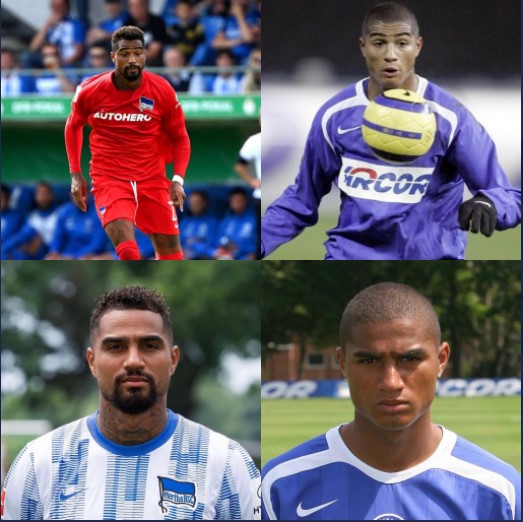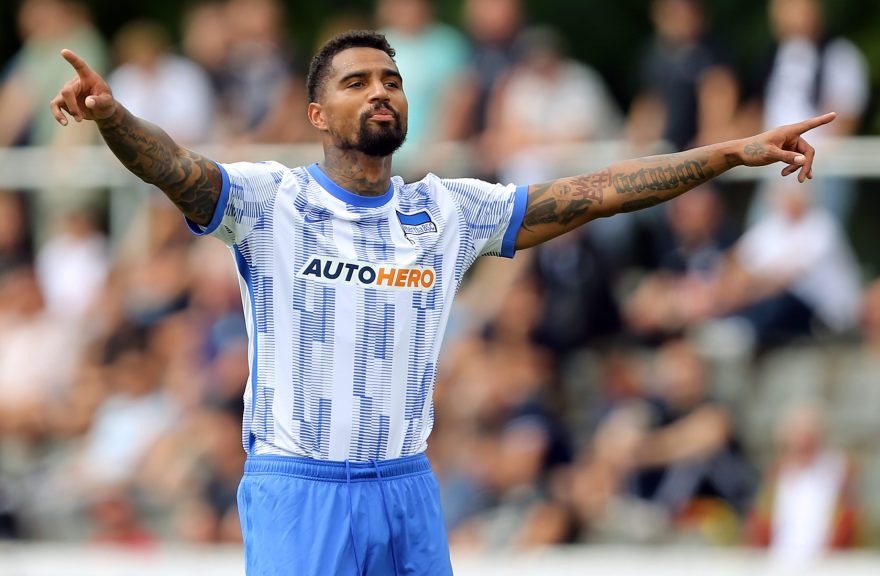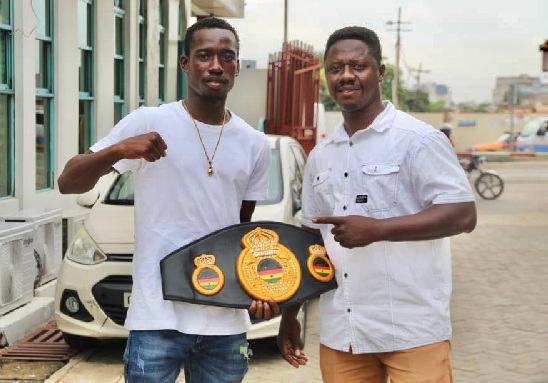Kevin-Prince Boateng has already played for some of the world’s biggest clubs and got his hands on some of the game’s biggest prizes. Now, though, the fresh prince of Berlin is hoping to make his homecoming at Hertha a memorable one.
The German capital is where Boateng was born and where it all started for him as a player. First there were the football cages and pitches around his local district of Wedding, and then – from the age of seven – there was Hertha Berlin. He made his Bundesliga debut in August 2005 and – after time spent in England, Italy, Spain and Turkey as well as at several other German clubs – he returned in June 2021.
“I’ve got Berlin in my DNA,” he told bundesliga.com ahead of Hertha’s Matchday 2 fixture against Wolfsburg, his first home game since rejoining. “I’m a true son of the city and back with the message that street footballers never give up. They always have the chance to make it to the top.”
Boateng credits what he learned as child in Wedding – a multicultural and traditionally working-class area in northwest Berlin – with allowing him to play in the world’s biggest stadiums. It no doubt helped him forge the force of personality that enabled him not just to reach the professional game, but also to stay in it for so long.
Born to a German mother and Ghanaian father, the veteran midfielder broke through at Hertha around the same-time as his half-brother Jerome Boateng. While Jerome moved on to Hamburg and Manchester City before enjoying a hugely successful period at Bayern Munich, his older sibling initially headed for London in 2007.
Boateng admitted many years later that he had “lived like a king” at Tottenham Hostpur, and that his head was turned by flash cars and a luxurious lifestyle when hard work was still needed to go with his undoubted talent.
“I had all the money, but didn’t treat football as a job,” he said.
Jürgen Klopp brought him to Borussia Dortmund on loan from Spurs in 2009, however, and the current Liverpool boss would have extended their relationship had his club not been priced out of making the move permanent.
“If we had the money tomorrow, he would be back the day after tomorrow,” Klopp told the Süddeutsche Zeitung in 2010.
While Klopp stressed in the same interview that the player still had a lot to learn tactically, he marvelled at how Boateng had “dozens of options” for going past an opponent and had the ability to receive the ball in “100 different ways.”

Almost as likely to score with his left foot as his right, Boateng moved on to Portsmouth and reached the 2010 FA Cup final before lining out for Ghana at that summer’s FIFA World Cup. He had previously played for Germany up to U21 level, but in South Africa he faced his brother Jerome as the Germans just edged the African side in the group stage.
The younger Boateng by two years, Jerome has previously highlighted that his own success owes a lot to being able to discuss anything and everything with his sibling.
“I have other brothers but with him it’s something special because we’ve followed this common path together since childhood,” Jerome, who left Bayern Munich in the summer of 2021, told bundesliga.com.
In 2010 that road took Kevin-Prince to Italy where – with teammates like Alessandro Nesta, Mark van Bommel, Andrea Pirlo, Clarence Seedorf, Zlatan Ibrahimovic and Brazilian pair Robinho and Ronaldinho – he scored three goals in 26 league appearances to help AC Milan win the Serie A title in 2010/11.
He left Milan in 2013 for a two-year stint with Schalke, later revealing that he contemplated quitting the game as his time in Gelsenkirchen drew to a close.

Instead, though, Boateng sought new sense of purpose. The highlights of his later career so far include an impressive stint at Eintracht Frankfurt as well as the six months he spent on loan at Barcelona in 2019.
It’s perhaps no coincidence that he was in such good form in Frankfurt. There he worked under fellow Wedding native Niko Kovac, who had been a veteran player at Hertha in Boateng’s first spell at the capital club.
By 2018 the former Croatia international – then Boateng’s coach at Eintracht – was referring to him as his “warrior” on the pitch. The two-footed, attack-minded player was harder than ever to shove off the ball in that season, driving Eintracht to DFB Cup success against Bayern.

Perhaps fitting for a player who has had 14 clubs and counting, though, Boateng ended up out of the spotlight for the 2020/21 season with Italian Serie B side Monza. Having led them to the promotion play-offs, however, he was tempted into one more challenge by making a move to what he describes as the “last stop” in his career.
Like Boateng, new Hertha sporting director Fredi Bobic had played for the club before. Like Kovac, he also had prior knowledge of what the 34-year-old can offer when he is on his game.
Bobic had, after all, signed Boateng at Eintracht. The former Germany striker said Hertha’s big-name summer recruit could have a similar leadership role to that played by 2014 FIFA World Cup winner Sami Khedira last season.
“He’ll definitely help us on the pitch, but what has impressed me is that he has developed as a person even more since our time together in Frankfurt,” Bobic told the Hertha website a month after Boateng’s return.
“You can see how happy he is to be back at Hertha. He’s always positive and that has a positive impact on the lads. Signing Prince was incredibly important for team spirit, and the guys are happy to be playing with him. He can carry on where Sami Khedira left off.”

Khedira announced his retirement from football in the summer of 2021 after helping Pal Dardai’s team pull away from relegation trouble. Boateng will be hoping to help Dardai – another former Hertha teammate – steer the Old Lady to a much higher finish in 2021/22.
“He’ll help us in the dressing room and in every training session,” the Hertha coach said of Boateng at the start of pre-season training.
Hertha have offered chances to plenty of young players in recent years, and Boateng is only too willing to give them guidance. He indicated that the latest rising stars are more concentrated on their job than his generation were, but that they still need to maintain that focus.
“The 19 and 20-year-olds here in the team have so much talent, but talent alone is not enough,” the former Besiktas and Fiorentina player told reporters.
“I learned that when I moved to Milan at 23 or 24. There were so many superstars in the dressing room that I realised ‘if you don’t work here, then you won’t play a minute.’ When the lads here understand that at 19 or 20, then all doors are open to them.”

Never afraid to speak his mind, the United Nations ambassador has used his star power off the pitch to speak out against racism – outlining the reasons for doing so in a remarkable 2020 article for The Players’ Tribune.
On the field, the well-travelled powerhouse still has unfinished business. He admitted to bundesliga.com, though, that even the mighty prince of Berlin could get some nerves ahead of his return to the Olympiastadion and that first home game against Wolfsburg.
Boateng revealed this summer that he had been ready to return to Hertha as long as five years ago, but now he’s just happy to finally be back home.
“It’s no secret that I’d always been eyeing a return to Hertha BSC,” he said when his return was confirmed. “The fact that it’s finally worked out makes me very proud.”
The hard work, though, is only just beginning.
“I want to give something back to Berlin: not only to Hertha, but also to the city,” he told reporters. “I have Berlin and Hertha to thank for having been able to do what I did.”
Credit: Bundesliga.com



